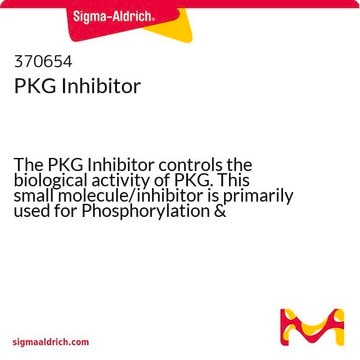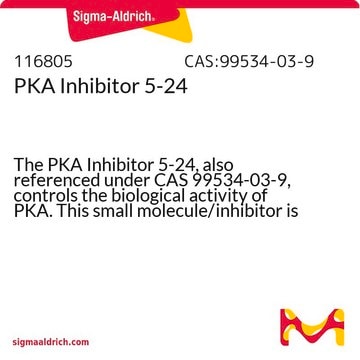420320
KT5720
≥95% (HPLC), solid, protein kinase A inhibitor, Calbiochem®
Sinónimos:
KT5720, PKA Inhibitor VII
About This Item
Productos recomendados
product name
KT5720, A potent, specific, cell-permeable, reversible and ATP-competitive inhibitor of protein kinase A (Ki = 56 nM) that is prepared by a chemical modification of K-252a.
Quality Level
assay
≥95% (HPLC)
form
solid
manufacturer/tradename
Calbiochem®
storage condition
OK to freeze
protect from light
color
white
solubility
DMSO: 1 mg/mL
shipped in
ambient
storage temp.
−20°C
InChI
1S/C32H31N3O5/c1-3-4-5-10-15-39-30(37)32(38)16-23-34-21-13-8-6-11-18(21)25-26-20(17-33-29(26)36)24-19-12-7-9-14-22(19)35(28(24)27(25)34)31(32,2)40-23/h6-9,11-14,23,38H,3-5,10,15-17H2,1-2H3,(H,33,36)/t23-,31+,32+/m0/s1
InChI key
ZHEHVZXPFVXKEY-RUAOOFDTSA-N
General description
Biochem/physiol Actions
PKA
Warning
Preparation Note
Reconstitution
Other Notes
Cabell, L., and Audesirk, G. 1993. Int. J. Dev. Neurosci.11, 357.
Gadbois, D.M., et al. 1992. Proc. Natl. Acad. Sci. USA89, 8626.
Kase, H., et al. 1987. Biochem. Biophys. Res. Commun.142, 436.
Legal Information
Storage Class
11 - Combustible Solids
wgk_germany
WGK 3
flash_point_f
Not applicable
flash_point_c
Not applicable
Certificados de análisis (COA)
Busque Certificados de análisis (COA) introduciendo el número de lote del producto. Los números de lote se encuentran en la etiqueta del producto después de las palabras «Lot» o «Batch»
¿Ya tiene este producto?
Encuentre la documentación para los productos que ha comprado recientemente en la Biblioteca de documentos.
Los clientes también vieron
Nuestro equipo de científicos tiene experiencia en todas las áreas de investigación: Ciencias de la vida, Ciencia de los materiales, Síntesis química, Cromatografía, Analítica y muchas otras.
Póngase en contacto con el Servicio técnico









